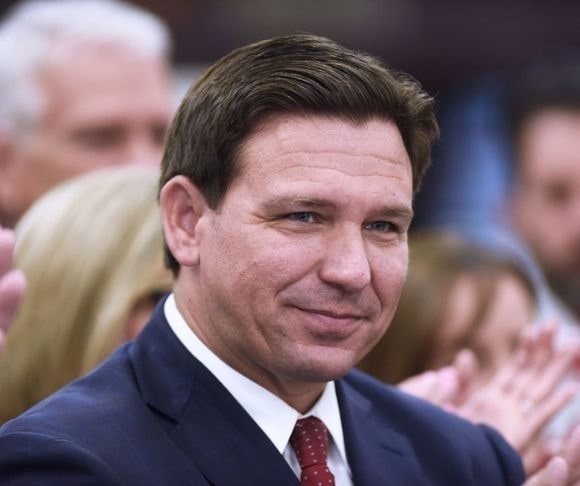
Ron DeSantis (Photo by Paul Hennessy/SOPA Images/LightRocket via Getty Images)
The one thing common to the great majority of Republican congressional and gubernatorial candidates in 2022 is their quest for the endorsement of Donald Trump. Across the land, all but a few GOP hopefuls have kissed the ring, seeking the cherished imprimatur of the 45th president. And even those who don’t receive it go to great lengths to assure voters they are entirely down with the MAGA cause.
But there is one glaring absence from the list. And it is conspicuous because it is that of a man arguably more directly associated with Trump than any other politician on the national stage. In fact, he could with good reason be called Exhibit A in the proliferation of the Trump revolution.
 And yet, as he runs for a second term as governor of Florida, Ron DeSantis has yet to seek the endorsement of Trump. What are we to make of this? Does DeSantis believe the Trump brand has become tarnished, while his own has been famously on the rise, and thus he can capture more independent and Democratic votes in his re-election bid by keeping Trump out of it? Or is this the first blush of DeSantis striking out on his own in advance of a presidential candidacy in 2024 — regardless of whether Trump runs again? Until recently, conventional wisdom held that DeSantis would run only if Trump did not.
And yet, as he runs for a second term as governor of Florida, Ron DeSantis has yet to seek the endorsement of Trump. What are we to make of this? Does DeSantis believe the Trump brand has become tarnished, while his own has been famously on the rise, and thus he can capture more independent and Democratic votes in his re-election bid by keeping Trump out of it? Or is this the first blush of DeSantis striking out on his own in advance of a presidential candidacy in 2024 — regardless of whether Trump runs again? Until recently, conventional wisdom held that DeSantis would run only if Trump did not.
But the commentariat in both conservative and leftist media are honing in on the drip-drip-drip of damage done to Trump in the Democrats’ Jan. 6 War and Peace-length passion play. And they are reporting a growing discomfort in professional GOP circles with Trump’s continuing outspoken insistence on relitigating the 2020 election and using it as a necessary precondition for his endorsement. The immediate beneficiary of the growing internal wariness about Trump is the man from Florida who embraced the MAGA revolution as quickly, loudly, and forcefully as any public official.
Both Trump and DeSantis are blunt instruments, disrupters, and combatants. But is that where the parallels end? For all his defiant actions during the pandemic, his public arguments with sacred cows like Disney, his fire-and-brimstone on the front lines of the nation’s raging culture war, DeSantis is at heart a policy wonk. While Trump is legendary for closing deals, DeSantis has by all accounts a mind like a steel trap. In a recent lengthy profile in the left-wing New Yorker — “Can Ron DeSantis Displace Donald Trump as the G.O.P.’s Combatant-in-Chief?” — the Florida governor is depicted as having “an intense work ethic, a formidable intelligence, and a granular understanding of policy. Articulate and fast on his feet, he has been described as Trump with a brain.” At the same time, a Republican consultant notes a brash self-confidence in DeSantis similar to that of the flamethrower Trump: “Ron’s strength as a politician is that he doesn’t give a f–k … Ron’s weakness as a politician is that he doesn’t give a f–k. Big donors? Cancels on them all the time.”

Ron DeSantis (Photo by Paul Hennessy/SOPA Images/LightRocket via Getty Images)
Perhaps that is because DeSantis’ fundraising skill has become almost legendary. As soon as he was elected to the House of Representatives in 2012 for the first of three terms, he became extremely aggressive — and successful — in wooing major donors for the long haul, no mean feat for a freshman congressman. But those relationships have produced huge dividends over the years, and DeSantis has now raised more than $124 million for his re-election bid — with more than 40 billionaires among his contributors — while Democratic nominee Charlie Crist, himself a grizzled political veteran, has collected barely $10 million. The politician’s politician, Crist holds the unique distinction of running for office as first a Republican, then an independent, and now — presto change-o — a Democrat. DeSantis is considered a heavy favorite, leading his opponent by almost nine points in the most recent average of polls from RealClear Politics.
Few doubt that DeSantis harbors presidential ambitions, or the likelihood he would seek the presidency in two years if Trump decides to stay out. But how big a victory would DeSantis need in his re-election bid in Florida to decide the time is ripe to seek the highest office in the land — even if Trump decides to jump in? Would a four- or five-point victory do it, or would he need a landslide win to demonstrate sufficient strength in a critical swing state to justify taking on Trump head-to-head?
Trump supporters may try to discourage a DeSantis challenge by citing age as a factor — for both candidates. Trump will be 78 if he runs again, facing his last shot at the brass ring as an historic figure who bent the Republican Party to his iron will, and should be given the stage all by himself, the argument goes, while DeSantis will be just 46, with plenty of time to run once Trump is gone. Of course, that same argument was used by Hillary Clinton to try to stop young Barack Obama in 2008 — and we know how that wound up.
 At the same time, some have spoken to the matter of a “dream” Trump-DeSantis ticket, but it hardly seems likely that the ego of either man could tolerate the presence — or upstaging — of the other. DeSantis supporters also would bristle at the suggestion that their man is little more than a Trump acolyte, having established his own political bona fides well before Trump entered the stage. Nevertheless, his career undoubtedly exploded once he was endorsed by the bombastic billionaire in the White House, a fact Trump is never hesitant to point out.
At the same time, some have spoken to the matter of a “dream” Trump-DeSantis ticket, but it hardly seems likely that the ego of either man could tolerate the presence — or upstaging — of the other. DeSantis supporters also would bristle at the suggestion that their man is little more than a Trump acolyte, having established his own political bona fides well before Trump entered the stage. Nevertheless, his career undoubtedly exploded once he was endorsed by the bombastic billionaire in the White House, a fact Trump is never hesitant to point out.
Is the pupil on the verge of outdistancing the teacher? If so, it is largely because DeSantis has effectively built his own independent power base, using the bully pulpit of a state he delivered comfortably to Trump in 2020 to forge his own political identity. He proudly describes Florida under his leadership as “a citadel of freedom,” a refuge for people “chafing under authoritarian rule.” The question now becomes whether continuing to govern that state likely to hand him a decisive victory in November is enough to satisfy him? Will it lead him to be patient about his presidential ambitions, or bow to the impatience of his relative youth, deciding there is no better time than the present?
Remember to check out the web’s best conservative news aggregator
Whatfinger.com — the #1 Alternative to the Drudge


